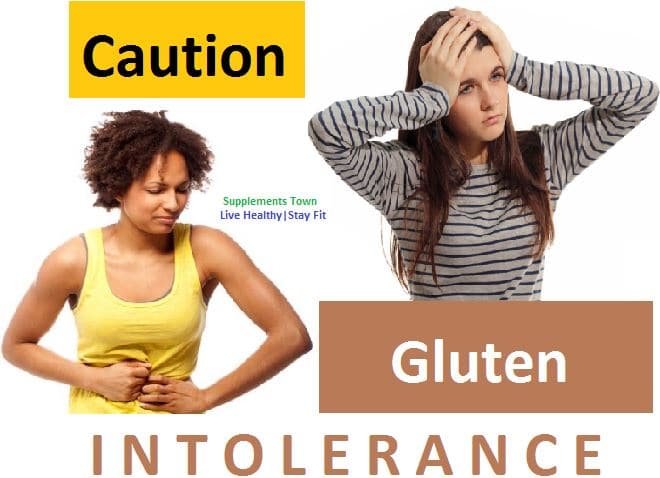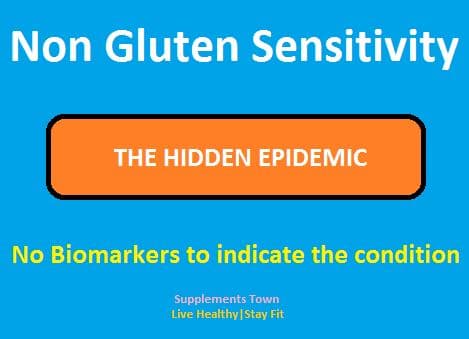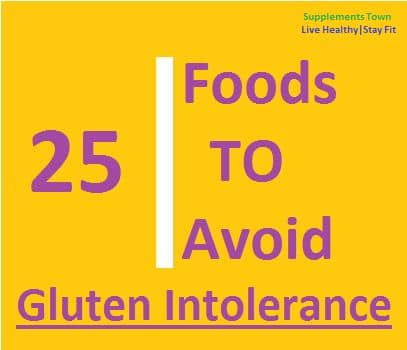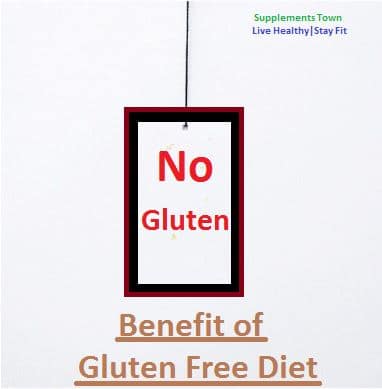How to treat gluten intolerance- Here are 5 things you should know today
Having a hard time digesting some foods and you quickly feel bloated after eating those foods? There are chances you are suffering from gluten intolerance. But the sad news, most of the cases of gluten intolerance are left undiagnosed. You can even have hard times getting it treated right. The symptoms of gluten sensitivity are either misunderstood or mistaken with other health complications.
Being said, there is no actual data on people suffering from gluten intolerance. But, it is estimated that 5% to 10% population of world has been affected with gluten sensitivity says by Peter Green M.D, the author of Celiac Diseases-A Hidden Epidemic. Also, it is interesting to note that only 1 out of 4700 has been diagnosed for gluten intolerance. So, it becomes really important to identify this problem and deal with gluten intolerance accordingly.
The real answer to the problem of gluten intolerance lies in the article. We have included all the necessary information on beating gluten sensitivity and living a healthy life. Our information will narrow down as
- What is gluten?
- What is gluten intolerance?
- Types of Gluten intolerance
- Gluten allergy symptoms
- Gluten free diet
What is Gluten?
Gluten is a type of protein which is generally found in grains like wheat, rye, oats and barley. It is a composite of two proteins namely glutenin and gliadin. When these two proteins combine together, they make gluten.
Have you ever wondered why a lot of our foods contain gluten? Most of the foods like your bread, cakes, pastries and chapattis all contain gluten. The gluten has glue like property which when mixed in these foods give them elasticity. And, give the food a satisfying and chewy texture.
What makes gluten so harmful?
The gluten is made up of two proteins glutenin and gliadin. The glutenin possess insoluble nature, whereas the gliadin is soluble in nature [1]. It is gliadin which has harsh effects on your body [2]. Consuming gluten, your body confuses gluten with a foreign invasion. And, this triggers an antibody attack response by your immune system against this foreign invasion.
If this attack is more prone, an enzyme transglutaminase in the cells of digestive system also gets affected. This causes you to suffer from celiac disease, which is the most severe case of gluten sensitivity. It can further lead to nutritional deficiencies and other digestive issues like leaky gut. Stating that, consumption of gluten can cause you to suffer from gluten intolerance. So what is this gluten intolerance?
What is gluten intolerance?
Gluten intolerance is sensitivity or an allergy occurred in your body after ingesting gluten. The extent to which a person can tolerate gluten varies at personal level. There are primarily two types of gluten tolerance reported among individuals. Also, there are many other types of gluten intolerance. But we will mainly discuss about the two major types of gluten allergy.
The two major type of gluten intolerance share their symptoms with some kind of digestive disorder. However, some symptoms of the gluten intolerance are very harsh and differ from just having digestive disorder. So, it becomes really important for you to understand both types of gluten intolerance to counter your condition.
Types of Gluten intolerance
Ingestion of gluten can cause you to suffer many types of gluten intolerance. The intolerance or type of gluten allergy depends upon type of gluten ingredient or the food you ate. The patient who is screened for gluten intolerance mainly falls under two types of gluten intolerance.
- Celiac Gluten Sensitivity
- Non Celiac Gluten Sensitivity
Celiac gluten sensitivity (CGS)
Celiac gluten sensitivity is an autoimmune condition which can occur from ingestion of gluten. Ingestion of gluten in patients suffering from celiac auto immune disorder causes damage to the lining of small intestine, also known as villous atrophy [3]. You can then experience malnutrition and a permanent damage to your intestines [4].
The celiac gluten sensitivity can cause you to suffer from more than 200 gluten intolerance symptoms. It is also estimated that about 1% of the total population is suffering from celiac gluten intolerance. And, out of that 1% population, only 17% cases come under diagnosis.
Who are at a risk of celiac gluten sensitivity?
An individual can occur to the condition of celiac gluten sensitivity at any time in his or her lifetime. Celiac gluten intolerance is a genetic autoimmune disorder. This means that if you have a history of celiac running in your family, there are 5%-10% chances of yours to get treated for the same disorder [5].
Furthermore, if you are already suffering from some other kind of autoimmune disorder, you are then at a higher risk of developing celiac gluten sensitivity [6]. These autoimmune disorders include thyroid problems, type-1 diabetes, and rheumatoid arthritis.
Non-Celiac Gluten Sensitivity (NCGS)
Non celiac gluten sensitivity is a condition which can also occur on ingestion of gluten. But it is completely different from celiac gluten sensitivity. The patients who experience some of the symptoms celiac disease after ingesting gluten but test negative for celiac disease. They fall under the condition of non celiac gluten sensitivity [7].
It simply means you are experiencing same symptoms but lack antibodies and villous atrophy which occur in celiac gluten sensitivity. This type of gluten intolerance has no biomarkers to indicate the problem [8]. So, it becomes more difficult to diagnose this type of gluten sensitivity.
Who are at a risk of non celiac gluten sensitivity?
As we have said above, there are no biomarkers to diagnose this condition. It becomes really difficult to say who are at risk of this type of gluten intolerance. However, the patients who suffer from some kind of gastrointestinal disorders are at a risk of non celiac gluten sensitivity.
Testing for celiac sensitivity and wheat allergy can help you detect non celiac gluten sensitivity in your system. It is because, if you are tested negative for these two conditions, there are chances you are suffering from gluten intolerance because of NCGS.
Some other forms of Gluten intolerance worth to mention:
1. Wheat Allergy/ Wheat Intolerance:
It is a common food allergy experienced by individuals after eating wheat. The symptoms of gluten intolerance are also common with people having wheat intolerance. They may show no signs of gluten intolerance with other gluten containing foods.
2. Gluten Ataxia:
Gluten Ataxia is an autoimmune condition which occurs on ingestion of gluten. It is a rare condition in which the antibodies from your immune system attack the cerebellum of your brain. A patient suffering from gluten ataxia can experience speech, gait and body balance problem. The muscles in the body get affected and lack coordination.
Gluten Allergy Symptoms
Understanding and evaluating yourself for the common gluten allergy symptoms can benefit you towards eliminating gluten intolerance from your system. As, we have already mentioned above that most of the cases of gluten intolerance go undiagnosed. It is because of the wrong diagnosis or confusing it with some other digestive disorder.
It becomes important for you understand gluten allergy symptoms for both types of gluten sensitivities. Let us now put light on the gluten allergy symptoms for the two types of gluten intolerance.
Symptoms of Celiac Gluten Sensitivity
The symptoms of celiac gluten sensitivity can occur in any form. It can be in the form of digestive disorder or it can be an issue in some other part of your body. The symptoms of celiac gluten intolerance vary among different individuals. It can affect you whether you are an adult or children.
Celiac gluten allergy symptoms experienced in children
- Abdominal Pain and bloating
- Vomiting
- Unexplained weight loss
- Diarrhea
- Smelly Faeces
- Stunned growth
- Delayed puberty
- Chronic fatigue
- Anaemia
- Enamel defects in permanent teeth
Celiac gluten allergy symptoms experienced in Adults
- Anxiety
- Brain Fogging
- Depression
- Migraine or headaches
- Continuous Mood swings
- Heartburn
- Lacking muscle coordination
- Lactose intolerance
- Liver Issues like fatty liver
- Numbness in arms and legs
- Infertility
- Menstruation problems
- Itchy Skin Rash or dermatitis herpetiformis
- Eczema
- Autoimmune disorders like Thyroid, Type 1 diabetes, Irritable Bowel Disease
Symptoms of Non Celiac Gluten Sensitivity
The non celiac gluten sensitivity is most difficult to diagnose gluten intolerance. It is a controversial condition which has no exact biomarkers to determine. A new study [9] also suggested that gastrointestinal symptoms in non celiac gluten intolerance can be a result of FODMAPs.
FODMAP`s are poorly absorbed short chain carbohydrates which are contained in gluten contained foods. But there is no solid evidence on what exactly contributes to non celiac gluten intolerance. So it becomes important you put your notice on non celiac gluten allergy symptoms.
Non Celiac Gluten Allergy symptoms
- Brain fogging
- Chronic Fatigue
- Mild headache
- Gastrointestinal problems including gas and bloating
- Fibromyalgia
If you are repeatedly occurring to any of the above gluten intolerance symptoms, it becomes important that you visit a doctor to diagnose your medical condition. The doctor can help you identify your problem especially if it is celiac gluten sensitivity. The non celiac gluten sensitivity, as we have said is hard to determine. But it has been said and studied [10]that following gluten free diet can improve your condition if you are gluten intolerant.
Gluten Free Diet
A gluten free diet will help you manage gluten intolerance symptoms. You will likely to improve your health by eliminating all medical conditions caused by ingesting gluten. A gluten free diet contains foods which are completely away from containing gluten.
Have you ever wondered, almost every food you eat has gluten contained in it? This makes it difficult to follow a gluten free diet. The food groups containing wheat, barley, rye all contains gluten. These gluten foods are generally included in your day to day groceries.
Foods to avoid with gluten intolerance (Contains Gluten)
- Breads
- Semolina or durum Pasta
- Noodles(Except for rice and moong bean noodles)
- Pita bread
- Bagels
- Muffins
- Donuts
- Cakes & Pastries
- Pizza
- Pancakes
- Waffles
- Cookies
- Pretzels
- Crackers
- Corn flakes (Contains malt made of wheat)
- Rice puffs (Contains granola)
- Soy sauce
- Salad Dressings
- Beer and Malt contained beverages
- Processed Foods
Gluten may also contain in foods that go beyond your notice. It is also contained in foods in some other form or in form of cross contamination from other foods. These foods include
- Hydrolyzed vegetable protein
- Oats(Often contaminated)
- Maltodextrin
- Ice Creams
- Processed cheese
If so many foods contain gluten, are there any alternative choices available? Can you be able to eliminate gluten completely from your diet? The answer to a gluten free living is complete yes. There are lot of gluten free foods available for you. In today`s time, most supermarkets and grocery stores have products which are 100% gluten free. Our list of gluten free foods will help you deal with symptoms of gluten intolerance.
Gluten Free Foods
Going completely gluten free is the only present solution available for a person suffering from gluten intolerance. Also, we have mentioned above that some gastrointestinal symptoms during gluten intolerance are result of FODMAP`s present in your food.
So, we have prepared a list of gluten free foods which are also low on FODMAP`s. These gluten free foods come from various sources which include vegetable sources, fruit sources, and poultry and meat sources.
Also read: List of protein rich Foods
Gluten free Vegetables
- Chickpeas
- Cabbage
- Cauliflower
- Carrots
- Celery
- Potato
- Sweet Potato
- Cucumber
- Bell peppers
- Kale
- Radish
- Eggplant
- Tomato
- Lettuce
- Lemon
- Okra
- Broccoli
- Spinach
- Pumpkin
- Brussels sprout
Gluten free Fruits
- Apples
- Banana
- Orange
- Lemon
- Pears
- Kiwi fruit
- Dragon Fruit
- Passion Fruit
- Berries like blueberry, raspberry and gooseberry
- Guava
Gluten free cereals and grains
- Quinoa
- Popcorn
- Rice flakes
- Rice (White and Brown)
- Amaranth
Gluten Free seeds
- Chia Seeds
- Pumpkin seeds
- Sesame seeds
- Sunflower seeds
- Poppy seeds
Gluten Free Nuts
- Hazel Nuts
- Chest nuts
- Walnuts
- Coconut
- Peanuts
Gluten Free Poultry
- Eggs
- Chicken(Whether or not raised on gluten diet[11])
- Grass fed meat
- Turkey
- Fowl
Gluten Free Seafood
- Shrimp
- Crab
- Lobster
- Salmon
- Trout
The above listed items can be your pick for 100% gluten free living. In order to avoid gluten intolerance, you should eliminate gluten completely and follow the above mentioned gluten free diet. Following a gluten free diet has several benefits apart from just solving the condition of gluten intolerance.
Benefit of Gluten Free diet
A gluten free diet has gained a lot of popularity in recent times because of various health benefits it offer. Furthermore, a gluten free diet gives you a chance of eliminating all the processed and unhealthy foods from your diet. It makes you eat all the fresh fruits and vegetables. It is true that gluten free diet can help you with gluten intolerance but can also provide more health benefits. So what are the benefits we are talking about?
- Gluten Free diet improves Heart Health
Following a gluten free diet improves your cholesterol levels promoting a good heart health.
- Gluten free diet increases energy levels
Incorporating gluten free foods in your diet is sure to boost your energy levels, as said by Dr. Alex Johnstone. [12]
- Gluten free diet reduce chances of infection
Eating gluten free foods help you stay away from various types of infections and viruses which are generally contained in packaged and processed foods.
- Gluten free diet helps you to lose weight
Indulging into healthy gluten free foods can give you a chance of losing weight by eliminating bad foods.
Also read: How people are losing 10 pounds in 3 days?
- Gluten Free diet for improving medical conditions
It has been studied that following a gluten free diet improves health of patients suffering from autism [13].
Following a Gluten Free diet- What you should know?
If you are going to follow a gluten free diet, you should proceed with caution. Why we are saying that? Here are few important things you should know before starting your gluten free foods shopping.
-
- If you are going 100% gluten free, it is advisable that you rely on natural gluten free foods as we have mentioned in our above gluten free foods list. Most of the foods you see in grocery stores labelled as 100% gluten free are cheating their consumers. They often contains hidden gluten ingredient.
- If you wish to improve your medical condition by gluten free diet, you should make healthier gluten free choices. The main idea is to indulge into good food quality. Go for natural gluten free foods more often instead of packaged gluten foods.
- It is important for you to understand that a gluten free diet is meant to solve a medical condition. If you are not gluten intolerant, you should rather stay away from going gluten free.
- Eliminating gluten for individuals without any medical condition or on basis of self diagnosis can be harmful. It can cause various nutrition deficiencies. [14][15]
- If you wish to improve your health and don`t wish to go gluten free, then our Paleo diet plan for improved health and longevity will be a perfect pick for you.

Bibliography
| [1] | W. H, “Chemistry of gluten proteins,” German Research Centre of Food Chemistry and Hans-Dieter-Belitz-Institute for Cereal Grain Research, [Online]. Available: https://www.ncbi.nlm.nih.gov/pubmed/17008153. |
| [2] | W. H, “Relation between gliadin structure and coeliac toxicity,” German Research Institute of Food Chemistry, Garching, Germany, [Online]. Available: https://www.ncbi.nlm.nih.gov/pubmed/8783747#. |
| [3] | J. Anderson, “What Is Villous Atrophy and What Conditions Cause It?,” [Online]. Available: https://www.verywell.com/villous-atrophy-562583. |
| [4] | “Symptoms of Celiac Disease, Wheat Allergy, and Non-Celiac Gluten Sensitivity: Which Is It?,” [Online]. Available: https://www.healthline.com/health/allergies/gluten-allergy-symptoms#symptoms-of-celiacdisease. |
| [5] | “CELIAC DISEASE: WHO IS AT RISK?,” [Online]. Available: https://www.beyondceliac.org/celiac-disease/risk-factors/. |
| [6] | L. Konkel, “What Is Celiac Disease?,” [Online]. Available: https://www.everydayhealth.com/celiac-disease/guide/. |
| [7] | “WHAT IS NON-CELIAC GLUTEN SENSITIVITY?,” [Online]. Available: https://www.beyondceliac.org/celiac-disease/non-celiac-gluten-sensitivity/what-is-it/. |
| [8] | “CELIAC DISEASE, NON-CELIAC GLUTEN SENSITIVITY OR WHEAT ALLERGY: WHAT IS THE DIFFERENCE?,” [Online]. Available: https://www.gluten.org/resources/getting-started/celiac-disease-non-celiac-sensitivity-or-wheat-allergy-what-is-the-difference/. |
| [9] | P. Gibson, “Gluten for Punishment: Challenging Non-Coeliac Gluten Sensitivity,” Monash University, [Online]. Available: https://www.nhmrc.gov.au/nhmrc-in-focus/awards/gluten-punishment-challenging-non-coeliac-gluten-sensitivity. |
| [10] | R. Talaie, “Does gluten free diet have more implications than treatment of celiac disease?,” [Online]. Available: https://www.ncbi.nlm.nih.gov/pmc/articles/PMC4403029/. |
| [11] | “GRAIN FED CHICKEN: DO GRAIN PROTEINS PASS THROUGH TO HUMANS FROM THE MEAT WE EAT?,” [Online]. Available: https://www.glutenfreegigi.com/grain-fed-chicken-do-grain-proteins-pass-through-to-humans-from-the-meat-we-eat/. |
| [12] | “Gluten-free study calls for volunteers,” [Online]. Available: https://www.abdn.ac.uk/news/6330/. |
| [13] | M. S. J. S. D. T. S. B. L. S. Jennifer Harrison Elder, “The Gluten-Free, Casein-Free Diet In Autism,” [Online]. Available: https://link.springer.com/article/10.1007/s10803-006-0079-0. |
| [14] | “Think twice before going gluten-free,” [Online]. Available: https://www.health.harvard.edu/nutrition/think-twice-before-going-gluten-free. |
| [15] | M. G. M. FACLM, “How a Gluten-Free Diet Can Be Harmful,” [Online]. Available: https://nutritionfacts.org/2016/02/23/how-a-gluten-free-diet-can-be-harmful/. |











Leave a Reply